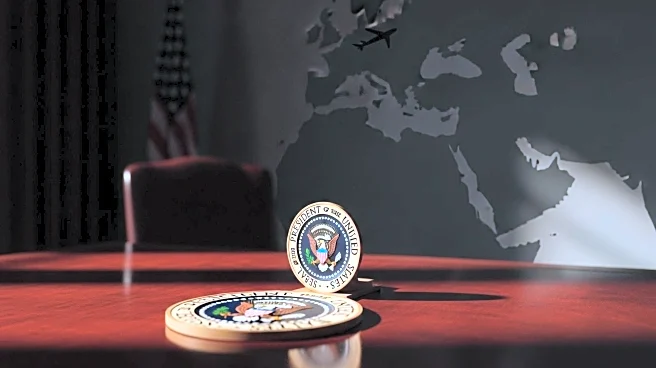What is the story about?
What's Happening?
President Trump is undergoing a 'semiannual physical' at Walter Reed National Military Medical Center. This visit was announced by the White House earlier in the week, coinciding with Trump's upcoming travel to the Middle East following a ceasefire deal in the Israel-Hamas conflict. White House press secretary Karoline Leavitt described the visit as a 'routine yearly check-up,' despite Trump having had his annual physical in April. The White House has not clarified why another check-up is occurring six months after the last one. Trump mentioned to reporters that he is meeting with troops and conducting a semiannual physical, expressing confidence in his health. His April physical indicated he was 'fully fit' to serve, with a report from his doctor noting a 20-pound weight loss since June 2020 and an active lifestyle contributing to his well-being.
Why It's Important?
The health of President Trump is of significant interest given his role as commander in chief, especially as he prepares for international travel and diplomatic engagements. Regular health assessments are crucial for ensuring he can fulfill his duties effectively. The timing of this physical, shortly after a previous annual check-up, raises questions about the president's health status and the necessity of frequent evaluations. The disclosure of Trump's chronic venous insufficiency, a common condition in older adults, highlights the importance of monitoring his health closely. This condition, while not immediately threatening, requires management to prevent complications, underscoring the need for regular medical oversight.
What's Next?
Following the physical, President Trump is expected to return to the White House. His upcoming travel to the Middle East will likely involve discussions and engagements related to the recent ceasefire in the Israel-Hamas conflict. The results of his physical may influence public perception and confidence in his ability to handle international affairs. Any significant findings from the physical could prompt further medical evaluations or adjustments to his schedule. Stakeholders, including political leaders and the public, will be attentive to any updates regarding his health, which could impact his diplomatic activities and overall leadership.
Beyond the Headlines
The frequent health assessments of President Trump may reflect broader concerns about the health and fitness of aging political leaders. This situation could spark discussions on the transparency of health information for public officials and the implications for governance. The management of chronic conditions like venous insufficiency in older leaders may also lead to conversations about healthcare access and preventive measures for aging populations. Additionally, the intersection of health and politics, especially in high-stakes international contexts, underscores the importance of maintaining robust health protocols for leaders.

















